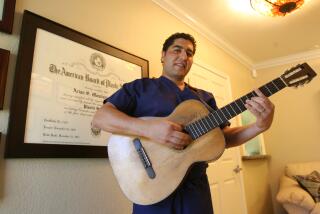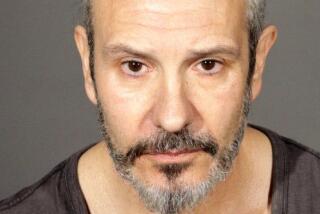Plastic Promises
- Share via
Ah, the price of beauty. Or as Dolly Parton once said, “It takes a lot of money to look this cheap.” You gotta love Dolly. Cosmetic surgeons do--especially her spirit of self-improvement.
After all, while surgeons are improving bust lines, they also are improving bottom lines--their own. And in this era of managed care, as insurers put the squeeze on doctors’ pay, more physicians have been offering cosmetic surgery in search of cash-paying customers.
“With reimbursement decreasing, the economics of health care are driving a lot of specialists not traditionally trained in plastic surgery into the field,” said Achilles Demetriou, head of surgery at Cedars-Sinai Medical Center in Los Angeles.
Because medical insurance doesn’t cover surgery deemed “cosmetic,” doctors who perform such procedures can basically charge whatever people are willing to pay. That has enticed doctors ranging from general practitioners to obstetricians to perform procedures they probably shouldn’t, experts say.
As a result, it’s hard to tell these days who’s really qualified--even in Southern California, which boasts some of the world’s finest enhancers.
The trick is to find the good ones. But with patients, not health plans, left to choose from among the slick ads and marketing claims, the chances of winding up with bad results escalate.
Problems can arise when surgeons work outside areas they are trained for.
“I would send one of my family members to an [ear, nose and throat doctor] for plastic surgery of the head and neck, but not for a breast augmentation,” said Dr. William Shaw, chairman of plastic surgery at UCLA Medical School. “Likewise, if an ophthalmologist wanted to do eyelid surgery along with laser resurfacing of the eyelids, that’s probably OK. But when he moves on to do a forehead lift as well? Now I worry.”
Because body liposuction, the fat-reducing procedure, is so popular, it seems like everybody is doing it--ear, nose and throat specialists, dermatologists, obstetrician-gynecologists and general surgeons. While these surgeons may have the technical skills, they haven’t had as much aesthetic training as plastic surgeons. Most dermatologists aren’t trained as surgeons, so they should limit themselves to liposuction of small areas, Demetriou said.
Even purists concede, however, that a competent doctor can learn two or three procedures outside his specialty.
“I’m not hatcheting all nonplastic surgeons who do cosmetic procedures,” said Dr. Robert Amonic, a plastic surgeon at St. John’s Hospital in Santa Monica. “Some are very good, even though they’re technically not qualified.”
The less complicated the procedure, the more people who can safely do it. Most experts agree, for example, that a plastic surgeon, a facial plastic surgeon or a dermatologist can probably successfully do laser resurfacing for wrinkles. And while an ophthalmologist and a plastic surgeon can probably both successfully perform eyelid surgery, the best bet is a board-certified ophthalmic plastic surgeon.
Guidelines to Choosing a Cosmetic Surgeon
Although doctors don’t all agree on who should or shouldn’t be doing what, here are some general guidelines to help you choose a cosmetic surgeon.
As a first step, narrow the field to a few qualified surgeons who frequently perform the procedure you want with good results. To find them, ask friends who liked their cosmetic surgeons or who work in the medical field, or ask a trusted family physician for a recommendation, said Dr. J. Regan Thomas, a professor of facial plastic surgery at St. Louis University School of Medicine.
Don’t rely solely on advertisements.
“The size or amount of advertising is not correlated to skill,” Thomas said. “In fact, there’s possibly an inverse correlation.”
After you have some doctors’ names, check out their backgrounds before scheduling a consultation. Ask the doctor’s office to send information about the surgeon’s education and training. Here are some things to look for:
* Did the doctor go to a reputable medical school?
* Is the doctor board-certified (meaning he or she went through additional training and passed a rigorous exam) in a particular specialty related to the procedure you are considering? (He may be a board-certified psychiatrist, but what does he know about hair transplants?)
* There are two respected certifying groups for plastic surgeons: the American Board of Plastic and Reconstructive Surgery and the American Board of Facial Plastic and Reconstructive Surgery. Beware of vanity boards, groups with official-sounding names that don’t require much in terms of training or membership qualifications.
* Verify that the surgeon is licensed and whether any past disciplinary actions or malpractice claims are on the doctor’s record. Check out a doctor by calling the California Medical Board, (916) 263-2382, or visiting the board’s Web site at https://www.medbd.ca.gov. The board can also tell you where the doctor went to medical school, whether any malpractice judgments exceeding $30,000 have been filed against the doctor in the last six years, and whether any hospital has revoked staff privileges in the last four years.
* Finally, see if the doctor is on staff at a nearby medical center. The question to ask, said Shaw, is “Where would he admit you in an emergency?”
After the background check, arrange to meet a few surgeons to get a feel for their style and to ask them questions. (See box, this page.)
Ask to See Pictures of Average Results
Avoid anyone who seems a “quick and hard sell,” Shaw said. “You want a surgeon who carefully considers the problem and discusses the various approaches with you in terms of risk and result.”
Ask to see before-and-after photos of patients who have had similar procedures--but don’t let the pictures sway you too much. Some of the less-reputable members of the medical profession hire beautiful models, manipulate photographs and show off glossy preoperative and postoperative books and videos that bear scant relation to the surgery. Ask your surgeon to show average surgery results.
Years ago, when Cheryl--who today is a fabulous-looking 50-something--had her breasts lifted, her surgeon showed her pictures of possible surgical scars.
“I thought for two years about having that surgery, deciding whether the scars were worth it before proceeding,” said Cheryl, who asked that her last name not be used. After surgery, the scars weren’t nearly as bad as the photo, but she appreciated not being oversold.
But when Cheryl went for liposuction on her legs a few years ago, she wasn’t as careful. After the doctor who did her breasts told her cosmetic surgery on her legs would not improve her appearance, she trusted a facial plastic surgeon when he said he could reshape her legs.
The result: a misshapen leg, with lumps and bumps that she hadn’t had before.
“I’m miserable with the result,” said Cheryl, who advises anyone considering cosmetic surgery to ask the doctor to see the surgical results of other patients in person.
Computer-generated before and after images may also mislead. What a surgeon can accomplish with a mouse and a scalpel are two different things, Amonic cautioned. “I doubt people can reproduce what they can do on a computer surgically. It has to go along with a heavy disclaimer.”
However, Dr. Robert Kotler, a facial plastic surgeon in Beverly Hills, is a proponent of computer imaging. He invites patients from around the world to e-mail their photos to him at https://www.bh4faces.com. For no charge, he will e-mail back a modified photo of what their nose, for example, might look like after surgery.
“I have no problem with informing the patient using technology that models the procedure, but the result better live up to the promise,” Demetriou said.
Besides photos that are too good to be true, other red flags patients should watch out for include egregious advertising, claims of a much quicker recovery than others promise, efforts to minimize a serious procedure, those pandering to people in a vulnerable state, a hasty impersonal consultation, the feeling that the doctor is running a mill, or costs that are too high or too low.
Which brings up the subject of ethics--something else you want your surgeon to have.
“In plastic surgery, the number of procedures you can perform [on a patient] is unlimited,” Shaw said. “It’s like the amount of money you can spend fixing up a house. The patient may be at a disadvantage with a surgeon who oversuggests or overpromises.”
If you go to enough people in this town, you’ll eventually find one who tells you what you want to hear. But is it the truth?
“People come in and say they want eyes like Sophia Loren’s,” Amonic said, “and I tell them it’s not going to happen no matter how you slice it.”
(BEGIN TEXT OF INFOBOX / INFOGRAPHIC)
Checking Out the Cosmetic Surgeon
Verify that your doctor is board-certified by calling the American Board of Medical Specialties, (800) 776-2378, or checking the board’s Internet site, https://www.certifieddoctor.org. Or contact the American Board of Facial Plastic and Reconstructive Surgery, (703) 549-3223, or on the Internet, https://www.abfprs.org.
What to ask the doctor:
After checking out a surgeon’s background and credentials, here are some other questions to ask:
* Where will the surgery be performed?
* If the surgery will be performed at an outpatient clinic, is that center licensed by the American Assn. for the Accreditation of Ambulatory Surgery Facilities? (Ask to see the certificate.)
* How many of these procedures do you perform a month?
* How long will the surgery take?
* Can you describe for me in specific terms what my options are for correcting the problem?
* What type of anesthesia will you use (local or general)? And who will administer it? (Ideally, it would be a board-certified anesthesiologist or, at a minimum, a nurse anesthetist.)
* Will you do the surgery yourself, and will you turn any part of it over to an assistant surgeon?
* What kind of care and instructions will I receive before and after surgery?
* How soon will I be able to return to work and see full results?
* May I see before and after photos and talk to patients who have had surgeries similar to the one I am considering?
* What are the medical and aesthetic risks of this type of surgery?
* How much will it cost?
More to Read
Sign up for Essential California
The most important California stories and recommendations in your inbox every morning.
You may occasionally receive promotional content from the Los Angeles Times.










